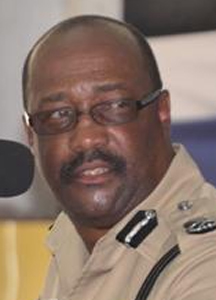Acting Commissioner of Police Leroy Brumell has noted the challenge posed to the police force by crime in the sprawling mining areas and said a number of measures have been taken including setting up roving patrols.
He raised the issue at the Annual Police Officers Conference which started on Thursday last week and ended on Saturday.
In a statement released on Monday on the conference deliberations, Eve Leary said that Brumell also underscored that the Force will continue its strategic, proactive approach in addressing crime; using intelligence gathering, crime prevention and crime detection activities while collaborating with its auxiliaries in order to maintain law and order. Brumell also said collaborating with government, NGOs and the public is also crucial to stemming crime. He made this address to an audience comprising President Donald Ramotar, Home Affairs Minister Clement Rohee and 164 officers at the conference which was held under the theme ‘Enhancing Community Safety and Secu-rity through Partnerships, Professionalism, Reform and Strategic Management.

The acting commissioner said at the close of last year crime statistics showed that there was a 4% increase in serious crime compared with 2010. There has also been a 7% increase in murders and the Force “did not fare well in terms of robberies” as it recorded a 1% increase in robbery under arms where instruments other than firearms were used to commission the crime and robbery with violence which contributed mainly to the overall 4% increase in serious crime.
Brumell also said there were a number of “disorderly murders” in the interior ‘E&F’ divisions where 30 of the 53 murders committed fell into this category. The high price of gold on the international market has resulted in an increase in mining and other activities in the goldfields and interior locations as more persons are venturing there for business. Brumell said the type of terrain hampers the GPF’s ability to respond to reports in a timely manner and the Force has established a number of checkpoints within the division, with roving patrols that check mining and logging communities and it has been working closely with other stakeholders to control crime.
On the other hand, he noted that the force has managed to maintain control over the type of criminal activities that cause fear in the society and a much better climate currently prevails in relation to business and social activities. Brumell also said that the attitude some ranks display toward the public adversely affects its image and public trust. As such he outlined a number of activities that police are involved in that would garner greater public support, in keeping with the aim of the conference to review, analyse operations, policies and procedures in addressing crime, traffic and other responsibilities.
Director of Public Prosecutions Shalimar Ali-Hack made a presentation on legal issues for officers, which was adopted as a working document, the release said. Assistant Commissioner Balram Persaud and three other officers who are members of the Management Unit responsible for its implementation also gave a presentation on the Force’s Strategic Plan.
Regarding training, the conference heard that there have been significant deliberations. “Specialised training inclusive of competency in the use of appropriate foreign languages and training at the University of Guyana and overseas were among many issues analysed,” the statement said. A management training facility was also built under the Citizen Security Programme to enhance training for all ranks and it will soon be handed over to the Force.
Community
policing
Community Policing Groups and civilian members of Station Management Committees were commended for their support to the GPF. They were recognised as key to building bridges with the public. The conference also heard that the Commu-nity Policing Organisation of Guyana will be observing its 36th anniversary this month under the theme ‘Building Safer Communities.’ In the light of this, discussions were held with representatives from the national and divisional community policing executive and civilian members of the station management committees on issues of mutual interest that impact on the development of the two bodies and improving relations with police.
Discussions were also held on issues such as police corruption and policing in the interior. Others included crime scene management, crime investigation, joint operations of the disciplined services, response capability to incidents of crime, border security and interior policing, prosecution in the courts, land and water transportation, police/community relations, local and overseas training, traffic management, human rights and domestic violence.
In his presentation, the president recognised the “sterling performance” of the GPF during the recent general elections noting that they have had to endure during a period when there were increasingly violent crimes involving the use of firearms. “I salute our Officers and men of the [GPF] who helped to bring an end to the infamous crime wave that endured in the early years of this century, and I pay tribute especially to the men who lost their lives so we could rid ourselves of the pestilence of these gangs,” Ramotar said.
He also said he expected increased accountability and care for state property and urged the Force to continue to work to boost its image with the public. “This can yield a great dividend for the Guyana Police Force since, as is well known, the support of the public is extremely important in crime-fighting,” he said.
In his address, Rohee commended the police’s response to challenges over the past year. The meeting also agreed that the 11-point expectations that the ministry has outlined for areas including a flexible response capability, responding to complaints, addressing the issue of corruption, training at the senior level of the force, marine capability, and a review of the divisional structures are to be pursued and as such a group of officers were mandated to study the document and recommend a plan of action.
The conference concluded with the traditional Mess Dinner at the Police Officers’ Mess where nine officers with an accumulated total of 312 years of service were dined out while 30 newly promoted officers were dined in.




